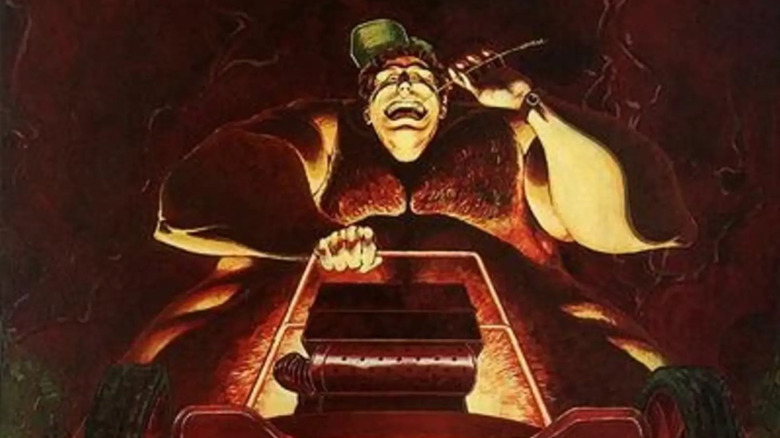Marvel Was Responsible For One Of The Earliest Stephen King Adaptations
Adapting the works of Stephen King has been a lucrative endeavor ever since the release of Brian De Palma's "Carrie" in 1976. That film was based on King's eponymous novel, published only two years before. That film made a ton of money on a low-ish budget, immediately cementing King as a creative force to keep an eye on. It was even nominated for Best Actress and Best Supporting Actress at the Academy Awards. In 1979, CBS aired the creepy King-derived vampire miniseries "Salem's Lot," and it also caused something of a stir, getting nominated for three Primetime Emmys. In 1980, Stanley Kubrick famously adapted King's novel "The Shining" to the big screen, and it, perhaps surprisingly, was nominated for two Razzies for Worst Actress and Worst Director (!). "The Shining," however, was re-litigated long ago, and it is now considered one of the scariest of all time.
In 1981, however, a rather obscure Stephen King adaptation was published that few likely remember. At the time, Marvel Comics had launched a series called "Bizarre Adventures," a throwback anthology book reminiscent of EC's horror comics of the 1950s. In issue #29 of that series, artist Walt Simonson took blocks of text from Stephen King's short story "The Lawnmower Man," and provided the appropriate accompanying drawings. King is the credited writer of the comic, even though a comic book author (uncredited here, but likely Simonson) would have been the one to lay out and edit the story into comic book form.
It was, chronologically, only the fourth Stephen King adaptation ever made. It predates classics like "Creepshow," "Cujo," "The Dead Zone," "Christine," and even that pop song adaptation of "The Stand" by British rock band The Alarm.
The Lawnmower Man was adapted into a Marvel Comic back in 1981
It should be noted right away that Stephen King's short story "The Lawnmower Man" bears no resemblance at all to the notorious 1992 film adaptation by Brett Leonard. Leonard's film was, quote bizarrely, a cyber-thriller about a mad scientist who uses VR tech and high-end drugs to turn a local gardener and mower of lawns into a supergenius. Everything goes wrong, natch, and the lawnmower man turns into a psychic supervillain. The movie was so far removed from King's story that the author successfully sued to have his name taken off.
The short story, meanwhile, was originally published in 1975 in Cavalier Magazine and was later included in King's 1978 compendium "Night Shift." It wasn't about V.R. tech, but a mysterious freelance gardener hired by an unassuming homeowner named Harold. The gardener, Harold finds, owns a lawnmower that seemingly runs by itself. Also, the gardener likes to trail behind the lawnmower naked, eating the grass clippings (!). It's revealed that the gardener is actually a satyr, and that he uses the lawnmower to sacrifice people to the great god Pan.
The 1981 Marvel Comics adaptation was a direct adaptation of King's story, which, as mentioned, used King's actual text. It also affected a tone of down-home Americana, stating that having a well-manicured lawn is a symbol of masculine strength, and that Harold was a little threatened by the gardener's assertive, unusual demeanor, and his mentions of the goddess Circe. The comic was in black-and-white, allowing some of the bloodier scenes to slip unnoticed past the notorious Comics Code Authority.
Hilariously, various online sources have had to point out that the Circe mentioned in this Marvel Comic is not the superheroine Sersi from "The Eternals."
There was another obscure adaptation of The Lawnmower Man as well
"The Lawnmower Man" was also the source of a little-seen 12-minute short film, produced in 1987 by director James Gonis and writer Michael De Luca. Horror fans may recognize the name Michael De Luca as the writer of Rachel Talalay's "Freddy's Dead: The Final Nightmare," John Carpenter's "In the Mouth of Madness," and Danny Cannon's "Judge Dredd." He also served as the executive producer on myriad high-profile horror movies throughout the 1990s and early 2000s. Trekkies know De Luca from his story idea for "Threshold," often considered one of the worst episodes of the series (although it's not that bad).
Gonis' 1987 short was part of King's famed Dollar Baby deal. The Dollar Baby program, King fans can tell you, was a special program the author set up to help out young, aspiring filmmakers. King knew that college kids might want to adapt some of his minor works to film, and he would frequently allow them to buy the rights to said minor works for a mere dollar. Gonis bought the rights to "The Lawnmower Man" and made an ambitious 12-minute short out of it. The short, however, has only ever screened at horror movie and Stephen King festivals. Its low budget and echoey, amateurish qualities make it reminiscent of "The Texas Chain Saw Massacre." Low-quality bootlegs of the short have leaked online.
And, of course, there are the big-studio feature film adaptations. Brett Leonard's film, mentioned above, wasn't accurate to King's story, but it was still successful enough to spawn a bonkers sequel in 1996. Only true explorers of schlock have seen Farhad Mann's 1996 film "The Lawnmower Man 2: Beyond Cyberspace" (later retitled as "The Lawnmower Man 2: Jobe's War"). Only the brave need apply.


